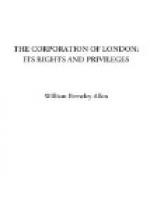City Expenditure.
There is no denying that at the first blush it does appear that an unnecessarily large amount of money is laid out annually on festivities. For instance, in the year 1855 upwards of 14,000 pounds were expended on the entertainments given to the Emperor of the French, the King of Sardinia, and the Prefect of the Seine. On minor occasions also very considerable sums are lost in like manner to the City treasury. But this apparent extravagance is not without its advantages. This generous hospitality has rendered the Corporation of London famous throughout the civilized world, and given it a fabulous influence among the nations of the Continent. The chief magistrate of the City is looked upon as only inferior to the sovereign, and far above all other princes and potentates. Thus, in a popular French play the principal personage is made to exclaim in an enthusiasm of ambition —“Yes, I will make myself great; I shall yet be count, marquis, duke, perhaps lord mayor.” The credit acquired by the City has been reflected upon the whole nation, and there are none so mean as not to have heard of the wealth, magnificence, and genial hospitality of the free-born citizens of the metropolis of the British empire.
With regard to thoroughfares, it has already been stated that the street tolls were mortgaged for some years, in order to raise the requisite funds for carrying out Farringdon Street to the northern boundary of the City. More recently an enormous debt has been incurred in the construction of Cannon Street. Half a million sterling has been sunk in the attempt to erect a handsome street, which should take off from Cheapside a portion of the exodus to London Bridge, and at the same time furnish a noble example of street architecture. In a pecuniary point of view the experiment has not thus far proved successful, but the very errors of the Corporation are on a grand and magnificent scale. Upwards of another half-million has gone to the construction of the new cattle-market at Islington and the model prison at Holloway. Newgate, also, is being enlarged and improved, and it is proposed to build a lunatic asylum on some lands recently purchased for the purpose in the neighbourhood of Croydon. A very large sum is annually expended in street improvements, besides a contribution of nearly 12,000 pounds a year to a metropolitan fund for objects not comprised within the liberties of the City. The Corporation also pays 11,000 pounds per annum towards the maintenance of the police force, though in other metropolitan districts this proportion of the expenses is debited to the Consolidated Fund. Of the charitable donations and subscriptions of the Corporation it is needless to speak, for their fame has gone forth throughout the world. The City of London School was built at a cost of 20,000 pounds, and year by year receives substantial support and encouragement. The education and maintenance of a hundred orphan children are provided for at another establishment; nor is there any charitable institution worthy of support that is not assisted with ungrudging liberality.




